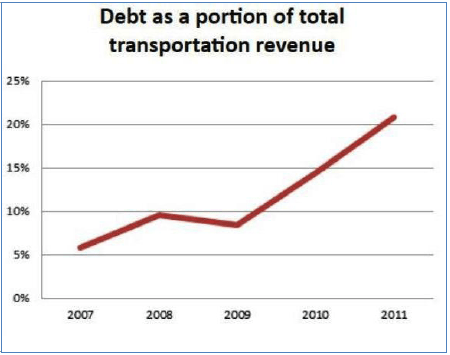If you value principles like social and fiscal responsibility, the Wisconsin transportation budget is an unmitigated disaster. Not only does Wisconsin DOT's spending plan gut funds to transit and local streets, it lavishes $900 million in borrowed money to pay for extravagant highway projects of dubious value to the public.

Good government groups and environmental advocates have proposed an alternative. The 10 Percent Solution, as they're calling it, would cut 10 percent, or $300 million, from the highway budget and shift it back to transit and local streets. The plan would reduce overall borrowing by 22 percent.
“Demand for transportation choices is increasing, while transit service is being cut and our roads and bridges are crumbling," said Bruce Speight, director of Wisconsin PIRG, which produced the report jointly with 1000 Friends of Wisconsin and the Sierra Club. "But the transportation budget proposal doesn’t help return taxpayer money to communities for road repair and transit. Instead, it funnels hundreds of millions into highway expansion projects."
A big problem with WisDOT's proposed budget, advocates say, is that state leaders continue to prioritize highway expansion even though Wisconsinites are driving less. On average, each resident drove 500 fewer miles in 2010 than in 2004.
"Wisconsinites need a transportation budget that reflects and supports how we travel, not the interests of highway lobby and big road construction firms who profit from taxpayer-funded and high-priced highway expansions," Speight said.
Meanwhile, the state has been consistently reducing its contributions to local streets. Since 1998, the share of statewide funding that was dispensed to localities for road maintenance has fallen from 32 percent to 19 percent -- a policy which is tantamount to increasing local taxes. Over that time, meanwhile, the share of state funds being used for highway expansion increased from 43 percent to 47 percent. To make matters worse, transit suffered a 10 percent cut in the 2011-2013 budget, and this new budget does not restore that funding.
While they nickel-and-dime essential services like transit, state leaders have a frustrating habit of splurging on high-dollar highway treatments.
"Wisconsin has chosen the most expensive option for construction in every case on the I-39/I-90 project," the report finds.
Steve Hiniker, executive director of 1000 Friends of Wisconsin, wonders why state leaders feel the need to mortgage Wisconsin's future for something the public isn't even demanding.
"Borrowing to pay for highways we don't need is going to haunt us for years to come," he said. "Our kids will be paying for these roads long after we are gone."





